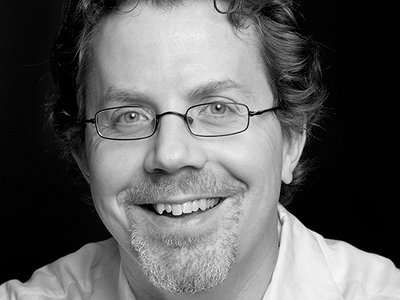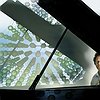Part 2
How do you make use of technology? In terms of the feedback mechanism between technology and creativity, what do humans excel at, what do machines excel at?
A lot of my sketching starts with Max patches: instead of writing notes on a score, I will imagine a process or texture and turn it into a computer program—usually one I can interact with in a spontaneous and improvisational way. Sometimes this electronic component survives into the final product and I make an electroacoustic piece, but sometimes it is incorporated into notation, computer music without computers.
I also use technology for visualizing and manipulating harmonic structures, for teaching myself to use new kinds of scales, and in many other training-type contexts.
Right now, I think computers (or more broadly: algorithms and theory) are helpful in generating material, leading us to new musical possibilities. Humans are much better at developing material into meaningful narratives.
Collaborations can take on many forms. What role do they play in your approach and what are your preferred ways of engaging with other creatives, including the artists performing your work?
I have had great collaborations with a number of writers—including Jeff Dolven, a poet and professor here at Princeton, who has written texts for several of my pieces. When I write vocal music, I feel like the words are in charge—I just read them and suddenly music pops into my head. For me, it’s totally different from instrumental composition. I don’t even think about evaluation: it’s not about good or bad, it’s about finding the music that belongs to the text. It’s not my fault if that music is defective in some way!
How is writing the music and having it performed live connected? What do you achieve and draw from each experience personally? How do you see the relationship between improvisation and composition in this regard?
I am really interested in improvisation, where the performer is acting as co-composer. Recently the Sirius quartet recorded Strawberry Field Theory, my improvisational string quartet, and it was an amazing experience—the players added to the notation in ways that I never could have imagined, making the piece much better! It’s hard to write this way because you have to learn to leave space for the improvisers.
I confess that sometimes I feel more conventional performance is less collaborative than it could be. Improvisation was hugely important in the 18th century, but we gradually evolved to a place where composers write down exactly what performers should play, and performers strive for 100% accuracy. A really great performance is magical, but my music is so hard that I often find myself just hoping that my notes and rhythms are played accurately.
Time is a variable only seldomly discussed within the context of contemporary composition. Can you tell me a bit about your perspective on time in relation to a composition and what role it plays in your work?
That is a great question. Time and rhythm for me are both very intuitive phenomena. I have so much to say about pitch, but rhythm and time and form are things I have almost no useful theoretical ideas about—and yet I am really interested in them.
I really like the way different composers can convey different understandings of time: the tautness of middle-period Beethoven vs. the expansiveness of Mahler. Lately, I feel that musical time has slowed down: I hear so much minimalist and post minimalist music that older pieces, like Schubert, sometimes feel like they are moving too fast.
One thing I am very aware of is the difference between the composer’s sense of their own piece, and the listener’s. By the time we let a piece go we have heard it (or imagined it) 1000 times, and this puts us in a different relation to the music. It is important to be able to imagine what it will sound like to someone hearing it for the first time.
I wish I had something more useful to say about this, but the best I can manage is that it is a matter of taste—and developing your taste is one of the hardest and most important things you have to do as a composer.
How do you see the relationship between the 'sound' aspects of music and the 'composition' aspects? How do you work with sound and timbre to meet certain production ideas and in which way can certain sounds already take on compositional qualities?
Another great question that I can’t answer! We’ve all had the experience where you’re at a cocktail party and someone says “oh, you’re a composer? What instruments do you write for?” And that sometimes feels like “oh, you’re a writer? What font do you write in, Geneva or Times?” Because we’re taught to think of instruments as inessential, and because our whole ecosystem depends on composers being willing to write for whoever asks them to write. “I write for whoever asks, whether it’s a bassoonist or a rock band.”
But in reality, that question is not so naïve: genre is really heavily determined by instrument. So, if you write for sax people will start to hear jazz; and electric guitar with distortion means rock; and violins will convey classical music; etc. So, in some sense, the most important compositional decision is what instruments you write for. In a way, the folks at the cocktail parties are onto something: instrument is more like content than like font.
But that’s just the tip of the iceberg: the distinction between musical and non-musical sounds has completely evaporated—in no small part due to popular music (where even in the 1960s you could hear alarm clocks and animal noises in songs) and sampling. Or we could talk about how the very dissonance of a harmony depends on timbre and register. Or about how the classical composers were experts at building redundancy into their music, so that it sounds incredibly good even on first reading …
Our sense of hearing shares intriguing connections to other senses. From your experience, what are some of the most inspiring overlaps between different senses - and what do they tell us about the way our senses work? What happens to sound at its outermost borders?
When I was younger I was really inspired by poets like Stevens and Ashbery, whose poetry creates the impression of sense without ever settling on definitive meaning; that was a feeling I tried to recreate in my music, typically by alluding to multiple styles … a kind of liquid musical surrealism where you move from one place to another without ever realizing that it’s happening.
Recently, my theoretical work has led me to think about the relation between musical structures and the visual realm; it turns out that a lot of our implicit knowledge of harmonic relations can be translated into a more explicit geometrical form. The most overt use of this idea is my orchestra piece, “The Thousand Faces of Form”, where live visuals (provided by the artist Nathan Selikoff) mirrored the geometry underlying the harmonic structure. So, what you see and what you hear are in some sense the same.
Art can be a purpose in its own right, but it can also directly feed back into everyday life, take on a social and political role and lead to more engagement. Can you describe your approach to art and being an artist?
I am not a composer who gets a lot of performances or public attention, so I have had to come to terms with that emotionally. This has led me to a view of composing as something like a monastic activity—a kind of private devotion or meditation that I pursue for its own sake. Sometimes I think of it more mathematically, as an active way of contemplating (or interacting with) musical structures that are actively beautiful.
I would probably be more interested in politics if I felt more people were listening.
It is remarkable, in a way, that we have arrived in the 21st century with the basic concept of music still intact. Do you have a vision of music, an idea of what music could be beyond its current form?
People once thought that we were surrounded by habitable planets easily accessible from Earth: in science fiction like Star Trek, the air of other planets is always breathable, and the aliens are always basically human—though maybe a little green. And then we learned that we were stuck on Earth for the foreseeable future if not permanently.
I think that the dream of other musical planets is in some ways similar. In A Geometry of Music, I make the case that there are only a small number of ways to satisfy basic musical constraints (e.g. harmonies that sound similar or melodies moving by short distances). So that might be taken as a reason for shifting focus from discovery of other musical planets to something like conservation of this one: just as we’re stuck here on Earth, so too might we be stuck with music that is broadly similar to what we know. In which case our job is to be good stewards of our inheritance.
Maybe that’s avoiding the question though … if you want a prediction I would say that in 50 years there will be serious, well-respected composers who write music that sounds a lot more like Beethoven than anything being written today.






